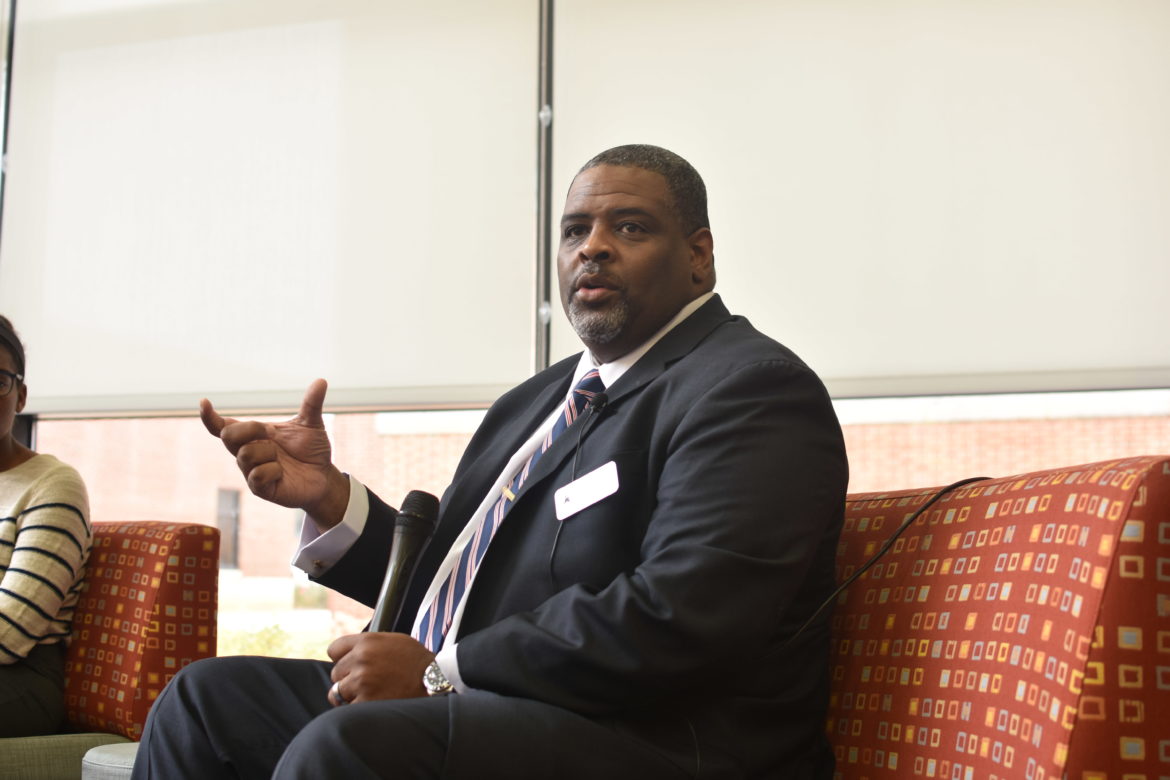Clarke County School District Superintendent Dr. Demond Means visits Clarke Central High School on Dec. 6 to take part in the IB/ODYSSEY Moderated Student Discussion with the Dr. Means program. Junior Alice Watson thinks the event was an effective way for CCHS students to dialogue with their superintendent. “(I came here) because I wanted to get to know who is in power, and who I would be talking to if I ever wanted to have some kind of change,” Watson said. Photo by Zoe Peterson
The Clarke Central High School International Baccalaureate/ODYSSEY hosted a Moderated Discussion with Dr. Demond Means, Clarke County School District Superintendent, on Dec. 6.
In order to establish direct communication with students, Clarke County School District Superintendent Dr. Demond Means attended a Moderated Student Discussion and Q&A with Clarke Central High School student representatives on Dec. 6. During this time, students were asked to address Means with their questions and concerns they had about CCHS and CCSD policies.
Prior to the open Q&A portion of the program, ODYSSEY Media Group News Editor Jurnee Louder, Sports Editor Hannah Gale and Senior Copy Editor Jordan Rhym moderated a panel discussion highlighting academic achievement, student athletics and community outreach within the CCSD. During the Q&A, Louder was pleased with student’s questions and Means responses.
“I think Dr. Means was very transparent in his answers. He didn’t seem to really censor himself — he was very open and honest,” Louder said. “I think kids seemed to be very engaged, they asked strong questions. I was excited to see kids come out there and speak to their superintendent and have some kind of concern about their education.”
Though there were a variety of questions, the racial achievement gap in the CCSD was a focal point. According to the statistics, Means shared pertaining to the racial achievement gap, 25 percent of African-American students at CCHS and 33 percent of Hispanic students who took the End-Of-Course American Literature test were classified as proficient learners, whereas 86 percent of Caucasians fell into the same category. Means considered and discussed the negative impacts of these statistics.
“(Students) have friends in elementary school, and eventually the friendship starts to gap. You pivot away from certain people, not because you don’t like them, not because they’re not interesting anymore, but because if you have a racial achievement gap, then what happens is that there becomes an academic skills gap, which then creates a life gap,” Means said.
Senior Jalisa Griggs wasn’t surprised by this data, and has ideas on how to combat the achievement gap.
“I kind of figured (there would be such a large achievement gap), and I think Dr. Means (could close the gap by) focusing on the new generation. That’s where it starts. If you focus on correctly and fairly educating kids, when they grow up, they will all be performing at a similar level,” Griggs said.
As a representative for the Women Studies Club, junior Alice Watson, questioned CCSD sexual education and sexual misconduct policies and advocated for changes to be made regarding them.
“I’d like to see better sex education policies, specifically regarding consent only being included in 12th grade curriculum, and also have (sex education) move into a better classroom environment, something with smaller (class sizes), where people can actually discuss,” Watson said.
In response to Watson’s question, Means addressed an alleged rape that occurred at Cedar Shoals High School in 2016 and the policies in place to combat sexual misconduct.
“I think we have the (sexual misconduct) policies that we need in place right now to address those issues and to make sure that everyone understands that that behavior is unacceptable. We have to be vigilant and make sure that our school environment is one in which people feel safe, and what happened at CSHS can’t happen on anyone’s campus,” Means said.
Overall, CCHS principal Marie Yuran believes this event was an effective way to start a conversation with Means about the agendas of CCHS students, and to give students the opportunity to share their perspective on school, community and national issues.
“(Dr. Means) says he (strives to be) accessible and approachable, and that doesn’t just mean to administrators, teachers or community members,” Yuran said. “(Students) are the consumers of this education. If (administrators) aren’t talking to our consumers to see what we can do better, then we wouldn’t be doing the right things.”
